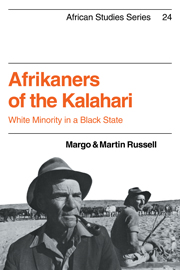Book contents
- Frontmatter
- Contents
- List of illustrations
- Acknowledgements
- A note on terminology
- 1 Southern Africa
- 1 The mundane Kalahari: an introduction
- 2 Boers, trekboers and bywoners: 1898–1930
- 3 Into the cash economy: 1930–72
- 4 Ghanzi Afrikaners 1973: a domestic description
- 5 Preserving boundaries: similarities, ambiguities and avoidances
- 6 Boers and Bushmen: dependence, interdependence and Independence
- 7 Sharing religion: attitudes to the conversion of the Bushmen to Christianity
- 8 Boers, bureaucrats and blacks
- 9 Prospect: whites in a black state
- Notes
- Bibliography
- Index
9 - Prospect: whites in a black state
Published online by Cambridge University Press: 04 August 2010
- Frontmatter
- Contents
- List of illustrations
- Acknowledgements
- A note on terminology
- 1 Southern Africa
- 1 The mundane Kalahari: an introduction
- 2 Boers, trekboers and bywoners: 1898–1930
- 3 Into the cash economy: 1930–72
- 4 Ghanzi Afrikaners 1973: a domestic description
- 5 Preserving boundaries: similarities, ambiguities and avoidances
- 6 Boers and Bushmen: dependence, interdependence and Independence
- 7 Sharing religion: attitudes to the conversion of the Bushmen to Christianity
- 8 Boers, bureaucrats and blacks
- 9 Prospect: whites in a black state
- Notes
- Bibliography
- Index
Summary
The political problems of polyethnic societies are legion. The liberal solution, the pretence that there are no ethnic differences, has only very recently had its ethnocentric weaknesses exposed; in practice nonracialism is frequently fraudulent, since those belonging to or willing to acculturate to the dominant group outpace all others. The various ameliorative poverty programmes in the United States of America and Britain are for the most part inspired by the ideal of assimilation to the middle-class life style. Egalitarian ideals are satisfied by the provision of weighted handicaps in the competition for bourgeois prizes of higher educational opportunity and highly paid employment.
The adoption by Botswana of a liberal, non-racial, national policy in 1966, just as illusions about liberalism in American and Britain were beginning to fade, was a bold step. If ethnicity was proving a tenacious factor in industrial societies, where its intrinsic irrelevance to the system could be argued, how much more tenacious it would be likely to be in a non-industrial society in which ethnicity had hitherto been the cornerstone of administration and organisation. Many factors contributed to the decision: the liberal British influence on decision makers; the necessity to be seen to be opposed to South Africa ideologically despite heavy dependence on South Africa economically; and the preponderance of Tswana in the composition of the population which ensured that for most people the policy would be without impact.
- Type
- Chapter
- Information
- Afrikaners of the KalahariWhite Minority in a Black State, pp. 135 - 144Publisher: Cambridge University PressPrint publication year: 1979



